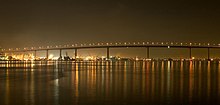Coronado Bridge
| San Diego–Coronado Bridge | |
|---|---|
 |
|
| Coordinates | 32°41′11″N 117°09′30″W / 32.6865°N 117.1583°WCoordinates: 32°41′11″N 117°09′30″W / 32.6865°N 117.1583°W |
| Carries | 5 lanes of |
| Crosses | San Diego Bay |
| Locale | San Diego and Coronado, California |
| Maintained by | Caltrans |
| ID number | 57 0857 |
| Characteristics | |
| Design | Orthotropic deck on box girder |
| Material | Prestressed concrete and steel |
| Total length | 11,179 feet (3,407 m) or 2.1 miles (3.4 km) (including approaches) |
| Width | 63 feet (19 m) between curbs |
| Longest span | 660 feet (200 m) |
| Number of spans | 32 |
| Piers in water | 21 |
| Clearance below | 200 feet (61 m) |
| History | |
| Successful competition design | 1978 World Bridge Beauty Contest |
| Constructed by | Murphy-Pacific |
| Fabrication by | Murphy-Pacific |
| Construction begin | February 1967 |
| Construction cost | US$48 (equivalent to $313 in 2016) million |
| Opened | August 3, 1969 |
| Replaces | San Diego and Coronado Ferry |
| Statistics | |
| Daily traffic | 75,000 (2009) |
The San Diego–Coronado Bridge, locally referred to as the Coronado Bridge, is a prestressed concrete/steel girder bridge, crossing over San Diego Bay in the United States, linking San Diego with Coronado, California. The bridge is signed as part of State Route 75.
In 1926, John D. Spreckels recommended that a bridge be built between San Diego and Coronado, but voters dismissed the plan. The U.S. Navy initially did not support a bridge that would span San Diego Bay to connect San Diego to Coronado. They feared a bridge could be collapsed by attack or an earthquake and trap the ships stationed at Naval Base San Diego. In 1935, an officer at the naval air station at North Island argued that if a bridge was built to cross the bay then the Navy would leave San Diego.
In 1951–52, the Coronado City Council initiated plans for bridge feasibility studies. By 1964 the Navy supported a bridge if there was at least 200 feet (61 m) of clearance for ships which operate out of the nearby Naval Base San Diego to pass underneath it. To achieve this clearance with a reasonable grade, the bridge length was increased by taking a curved path, rather than a more direct path to Coronado. The clearance would allow an empty oil-fired aircraft carrier to pass beneath it – it is not sufficient for Nimitz-class nuclear aircraft carriers in light load condition.
The principal architect was Robert Mosher. Construction on the San Diego–Coronado Bay Bridge started in February 1967. The bridge required 20,000 tons of steel (13,000 tons in structural steel and 7,000 in reinforcing steel) and 94,000 cubic yards of concrete. To add the concrete girders, 900,000 cubic yards of fill was dredged and the caissons for the towers were drilled and blasted 100 feet into the bed of the bay.
The bridge opened to traffic on August 3, 1969, during the celebration of the 200th anniversary of the founding of San Diego. The 11,179-foot-long (3,407 m or 2.1 mi) bridge ascends from Coronado at a 4.67 percent grade before curving 80 degrees toward San Diego. It is supported by 27 concrete girders, the longest ever made at the time of construction.
...
Wikipedia

